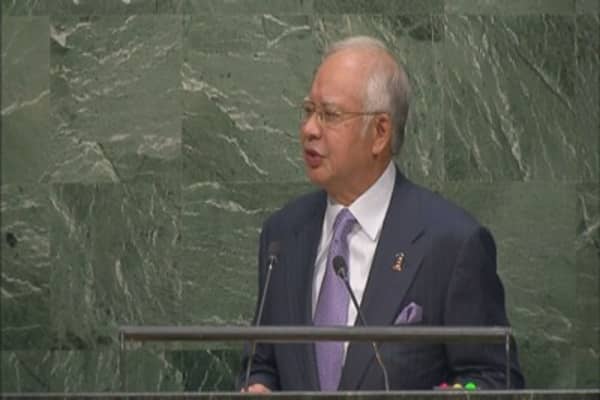Golez: The South China Sea power equation is undergoing major perturbations:
1.The Philippines is moving away from the US and towards China.
2. Vietnam's relations with the US is getting stronger.
3. Australia and Indonesia are planning joint patrols in the South China Sea.
4. And now Malaysia appears to be tilting towards China.
1.The Philippines is moving away from the US and towards China.
2. Vietnam's relations with the US is getting stronger.
3. Australia and Indonesia are planning joint patrols in the South China Sea.
4. And now Malaysia appears to be tilting towards China.
Malaysia's Najib Razak in China, as 1MDB scandal, South China Sea dispute loom over talks
CNBC.com
Malaysian Prime Minister Najib Razak heads to China this week for a state visit that could further skew Southeast Asian geopolitics in Beijing's favor, a week after Philippine leader Rodrigo Duterte initiated a similar shift.
Najib and a contingent of business executives will be on the mainland from October 31 to November 6, where "many new agreements and understandings" are on the agenda, the PM said in a statement.
But while the South China Sea and the 1MDB corruption scandal—topics impacting the international relations of both economies—aren't officially on the docket, they will indirectly influence each leader's rhetoric.
Najib is expected to focus on boosting Chinese funds into his country, paying particular attention to new technologies and infrastructure.
"Trade and investment is crucial at a time when Najib needs a further boost in the Malaysian economy so as to enhance his performance legitimacy to govern the country," Dr Mustafa Izzuddin, fellow at ISEAS-Yusof Ishak Institute, a Singapore-based think tank, pointed out.
"A sustainable growing economy, especially in 2017, will be a critical factor as to when Najib will hold the elections [due in 2018] and for Najib bolstering the chances of his coalition returning to government."
For the past two years, Najib has been embroiled in an international scandal around billions siphoned from state development fund 1Malaysia Development Bhd (1MDB), a situation that has tarnished his international reputation and triggered widespread calls at home and abroad for his resignation.
The blow to Najib's legitimacy has meant he's had fewer visits with Western leaders, resulting in lower foreign direct investment from the West, so China's friendship means a great deal, James Chin, director of the Asia Institute at the University of Tasmania, explained.
In return for funds, meanwhile, Beijing could gain a strategic ally in the thorny South China Sea problem.
Chinese leaders are upping the ante in the fight over rights to the resource-rich marine area by widening the mainland's network of supporters in Southeast Asia, Izzuddin said. Manila, a major player in the South China Sea dispute, recently realigned itself with the world's second-largest economy, with Philippine President Rodrigo Duterte announcing a separation from China's foremost rival, Washington, last week.
"China regards Malaysia as an important player in the Association of Southeast Asian Nations (ASEAN) bloc, and a claimant that Beijing believes it can have a more reasonable dialogue to address and resolve the South China Sea dispute, notwithstanding Malaysia's own shifting and ambiguous stance," Izzuddin explained.
"China knows Najib needs it more than the other way around, so Beijing will give him the five-star treatment to signal to the rest of the world that they have Malaysia in their pocket," Chin added.
Moreover, Beijing could use its own involvement in the 1MDB affair to sweeten the relationship. Because Chinese money helped save 1MDB from insolvency, Beijing will use its leverage on the issue carefully to keep Najib on China's side, said Chin.
In November, China General Nuclear Power Corp. said it would pay $2.3 billion in cash and take on an unspecified amount of debt for a group of power plants from debt-ridden 1MDB. The following month, China Railway Construction Corp agreed to buy a 60 percent stake in a 1MDB property project called Bandar Malaysia for $1.7 billion in a joint venture with Malaysian Iskandar Waterfront Holdings.
"Chinese leaders are aware that the U.S. [a key ally of Malaysia] have already pressed Najib. Taking the opposite position of non-interference is more likely to benefit China, as it will draw Malaysia under Najib closer, economically and strategically," noted Izzuddin.
A delicate trade-off
Like The Philippines, Vietnam and Taiwan, Malaysia claims a dozen of islands in the disputed South China Sea but unlike its peers, Najib's administration has stayed largely silent on the mainland's aggressive expansion in the area.
Manila under its previous leadership launched a legal case in The Hague to support its assertions, Vietnam has installed rocket launchers on its five bases in the area and even Taiwan, whose voice is often drowned out by Beijing, "ruled out the possibility of any active cooperation with China" on the issue, the American Chamber of Commerce in Taipei said in a report last month.
Kuala Lumpur's response, on the other hand, has been muted.
According to Reuters, Najib's government ignored reports of Malaysian fishermen being bullied by men aboard Chinese Coast Guard vessels last year. "When the Chinese entered Indonesia's waters, they were immediately chased out. When the Chinese vessels entered our waters, nothing was done," an unnamed Malaysian minister told Reuters in June.
In March, Minister Shahidan Kassim said that about 100 Chinese registered vessels were detected in the Luconia Shoals, one of the largest reefs in the South China Sea. But a few days later, then-defense minister Hishammuddin Hussein refuted those claims, in an indication of the government's policy confusion.
Strategists agreed that Najib was unlikely to press Beijing on the matter for fear of angering his country's largest trade partner. But Najib's silence on the South China Sea could then be used as fodder by angry Malaysians seeking the PM's exit over the 1MDB episode.
"One interesting question to come out of this is how ardent Malays feel about being in hock to China," William Case, professor at City University Hong Kong, remarked in an email.


No comments:
Post a Comment